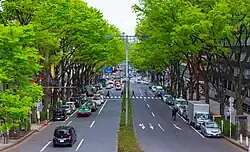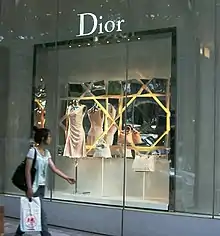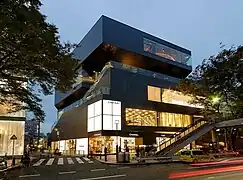Omotesandō
Omotesandō (表参道) is a zelkova tree-lined avenue located in Shibuya and Minato, Tokyo, stretching from the Meiji Shrine entrance to Aoyama-dōri (Aoyama Street), where Omotesandō Station can be found.

History
Omotesandō was originally created in the Taishō era as the frontal (表, Omote) approach (参道, Sandō) to Meiji Shrine, which is dedicated to the deified spirits of Emperor Meiji and his wife, Empress Shōken.[1][2]
Present
Omotesandō is known as one of the foremost 'architectural showcase' streets in the world, featuring a multitude of fashion flagship stores within a short distance of each other. These include the Louis Vuitton store (Jun Aoki, 2002), Tod's (Toyo Ito, 2004), Dior (SANAA, 2004), Omotesandō Hills (Tadao Ando, 2005) and Gyre (MVRDV, 2007), amongst others.
Omotesandō is the main vehicle and pedestrian thoroughfare for Harajuku and Aoyama. The area features many international brand boutiques, such as Louis Vuitton, Alexander McQueen and Gucci, as well as fast fashion retailers such as Gap, H&M and Zara. In his book Luxury Brand Management, luxury brand manager Michel Chevalier cites Omotesandō as one of the best locations in Tokyo for a luxury goods store.[3] Omotesandō is also home to the Kiddyland toy store, Laforet, and the Oriental Bazaar. Omotesandō's side streets, known as Ura-Harajuku, feature a range of smaller cafes, bars, restaurants, and boutique stores.
Omotesandō is the venue for Tokyo's annual Saint Patrick's Day Parade.[4]
Gallery
 Prada Aoyama
Prada Aoyama Tod's Omotesandō building
Tod's Omotesandō building
 Dior Omotesandō
Dior Omotesandō Designer retail complex "The Gyre"
Designer retail complex "The Gyre"
References
- "Meiji Shrine". Retrieved 22 March 2008.
- "Introduction". Archived from the original on 11 March 2008. Retrieved 22 March 2008.
- Chevalier, Michel (2012). Luxury Brand Management. Singapore: John Wiley & Sons. ISBN 978-1-118-17176-9.
- "St. Patrick's Day 2015". Japan Times. Retrieved 28 March 2015.
External links
- Pictures of Tokyo, Omotesandō (and surroundings, Aoyama, Jingūmae)
- Map of Harajuku, Omotesando